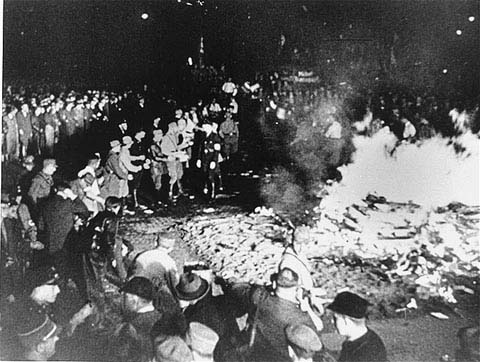
Nazi book burning
In Ben Click’s post yesterday on the banning history of Huckleberry Finn, he tells the story of a man who remembers hearing the book read to him when he was a child in a concentration camp. Horst Kruse never forgot that reading experience and would go on to become a Twain scholar. Ben talks about how fortunate it was that the book had managed to survive the censors so that Kruse could have this moment.
This in turn got me thinking about how many books the Nazis did ban and burn. I wrote in yesterday’s introductory note that authors would rather have their books banned than ignored—at least that means someone is paying attention—and writing that reminded me of a wonderful Bertolt Brecht poem called “The Burning of the Books.” The German poet had to flee the Nazis and then, after the war when he got brought up for questioning by the anti-communist House on Un-American Activities Committee, he fled back to communist East Germany. Here’s his poem:
When the Regime commanded that books with harmful knowledge
Should be publicly burned and on all sides
Oxen were forced to drag cartloads of books
To the bonfires, a banished
Writer, one of the best, scanning the list of the
Burned, was shocked to find that his
Books had been passed over. He rushed to his desk
On wings of wrath, and wrote a letter to those in power
Burn me! he wrote with flying pen, burn me! Haven’t my books
Always reported the truth? And here you are
Treating me like a liar! I command you:
Burn me


One Trackback
[…] He cites the wonderful Bertolt Brecht poem “The Burning of the Books” (I’ve posted on it here) in which the poet is outraged to find his work missing from the list of condemned […]